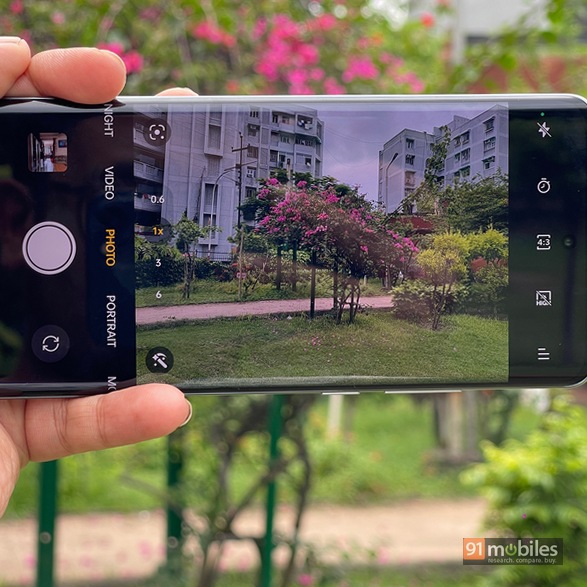OPPO Reno10 Pro Plus Review – Pros and cons, Verdict | 91Mobiles
The OPPO Reno10 Pro+ is a successor to the Reno8 lineup from last year, and has been announced in the Indian market for a price of Rs 54,999. This time around OPPO is promising big improvements in the camera department with a triple-lens setup that includes a 64MP periscope shooter capable of taking 120X digital zoom shots. The device also packs in flagship-grade internals thanks to the Qualcomm Snapdragon 8+ Gen 1 SoC. The Reno10 Pro+’s spec sheet looks like it has a point to prove and in this review let’s decipher where the handset stands viz-a-viz the competition.

Verdict
The Reno10 Pro+ proves to be an impressive phone, especially when it comes to aspects like display, battery, camera, and performance. Despite the bloatware, it competes well with other flagship devices. While the pricing may be a tough sell with alternatives like Moto Edge 30 Ultra (review), OnePlus 11 (review), and iQOO 11 available, the Reno10 Pro+ is still a solid choice under Rs 60,000.
Design and display
OPPO has been top of its design game for a long time and the Reno10 Pro+ does not give me reason to doubt it. The handset has a curved glass back panel with a satin matte finish and an aluminum frame that reaps the benefits of OPPO’s elegant build. Although the phone is not particularly light at 194g or thin at 8.28mm, its craftmanship makes it robust and rigid. The colour scheme adopted on the device is Silvery Grey which I find quite appealing. What I find slightly odd though is the rather large oval-shaped cutout that houses the optics on the device and how it juts out pretty sharply from the chassis. An IR blaster is present on the top while the phone’s bottom makes room for the usual assortment of USB Type-C port, dual-SIM slot, and bottom-firing speaker. The earpiece also plays a role in the audio setup by doubling up to provide stereo sound. I can safely say that the OPPO Reno10 Pro+ is probably one of the best-looking phones in this category.

Even the display metrics for the device are impressive enough to warrant an extended look. The panel employed is a 10-bit FHD+ (2,772 x 1,240) screen of the AMOLED variety, capable of refreshing at 120Hz. Having curved edges on both sides allows the bezels to be extremely slim and expands the screen real estate too. The display itself is pretty crisp visually and packs in 10-bit colour depth capable of showcasing over a billion colours. Apart from that the device does have the usual HDR10+ certification, expected in this price range, and its capabilities shine while viewing compatible content on Netflix.

Combined with the reasonably loud and clear stereo speaker setup, the Reno10 Pro+ becomes a competent media consumption machine. The panel uses LTPS technology allowing it intelligently shift between 120Hz all the way down to 45Hz when required. Brightness levels, which can go up to 1,400nits while displaying HDR content, are more than enough for sunny outdoor usage. In short, the Reno10 Pro+ acts as a superb visual aid for daily usage, and very few devices, if any, in its price range can brag about a better experience.
Cameras
On the back of the device is a triple-camera setup housed in a rather large enclosure. The primary image-taking responsibilities lie with the 50MP Sony IMX890 sensor and it is ably supported by a 64MP telephoto shooter that can take 3X optical images. Finally, there’s also an 8MP ultra-wide shooter with a 122-degree field-of-view, and on the front, a 32MP selfie shooter is housed in the punch hole. Now coming to the actual image quality from the primary sensor, my opinion is quite positive overall. Photos have more realistic colours which is a relief from the slightly saturated tones in earlier devices.

OPPO also has dispensed any unnatural AI-based scene enhancements, which I consider a win in my book. Of course, in the camera app there still are some filters that can be overlayed but it would be preferable not to rely on them. Focusing speeds are near instantaneous and change effectively based on subject movement. The image displayed on the viewfinder goes through a fair bit of post-processing, mainly to sharpen edges, improve colours, and add an extra touch of background blur. The dynamic range across various shots was pretty good during my testing time and OPPO claims a new exposure strategy that “redefines the HDR fusion and tone mapping processes to enhance the authenticity between light and shadow.” What I can say for sure is that the Reno10 Pro+ does let the shadows remain a bit darker than usual. Overall the snaps have rich contrast ratios and oodles of detail that benefits a lot from the phone’s creative output.

The telephoto sensor facilitates both 3X zoom shots and portrait images. Like the primary shooter, there is pixel-binning involved to capture shots and you can turn on the option to snap full-resolution 64MP images. However, upon further inspection, there were extremely minimal differences between both modes. Irrespective of this, the telephoto sensor does a fantastic job with portraits in good lighting conditions. It’s ability to discern between the subject and the background is exemplary, to say the least. Of course, you will need to stand a bit far to accommodate the 3X magnification but you do have the AI-based 1X zoom portrait mode that negates this. The lens can zoom as far 120X magnification levels but I feel that it is a bit of an overkill since the final output is quite grainy and over-processed. As for the 8MP ultra-wide sensor, the expanded FoV gives more breathing room to accommodate a large landscape. However, the detail levels away from the frame’s centre aren’t great.


Low-light photography is more than acceptable for the price. The device’s primary camera is about as good in the night as it is in the day. With some help by ambient light, the Snapdragon 8+ Gen 1’s ISP tones down noise levels without over-processing. I like how defined the shadows are and how the lens flare is reduced to a bare minimum. Exposure metering is another factor that adds more realism to the night and the Reno10 Pro+ makes sure the scene’s luminosity doesn’t become overtly bright. The telephoto and ultra-wide cameras, with smaller apertures, are not the best in low-light conditions. However, the dedicated Night mode feature works on both lenses to at least remove excessive oversharpening and add a little bit more detail across the frame. As a standard point-and-shoot camera experience in low light, the Reno10 Pro+ has me reasonably impressed.
Finally, there is the selfie shooter, which has a 32MP resolution and can snap well-defined shots with satisfactory facial detail on offer. The portrait mode is also quite good at edge detection even with multiple faces in the frame. Skin tones, I feel, can be slightly improved as the sensor has a tendency to whiten darker shades.
Performance and software
The phone runs on the Qualcomm Snapdragon 8+ Gen 1 platform, a flagship silicone from last year that can hold up its own for the foreseeable future. At its price point, there are other offerings that are powered with Qualcomm’s latest Snapdragon 8 Gen 2, including the OnePlus 11, iQOO 11, and the Galaxy S23. However, the difference in processing prowess is minimal compared to the 8+ Gen 1. Benchmarking numbers indicate about 13 percent jump between the two iterations, which is technically not large enough to make a substantial difference. In any case, the Reno10 Pro+ is extremely fluid and quick with its response to various applications and processes. I have yet to face any lag or stutter even when the handset is put under substantial duress. App switching is super quick, running multiple Chrome tabs while streaming HDR content on Netflix never posed a problem, and in general, the phone’s performance remained optimal.

Gaming will not be an issue with the Reno10 Pro+ thanks in part to a 3,500mm² vapour chamber and a special ultra-conductive graphite material in play that works to reduce thermal overload. With these additions, combined with the Adreno 730 GPU, the handset is able to deliver upwards of 90fps on PUBG: New State at Ultra graphics, without any frame drops. Finally, the phone also has 12GB of fast LPDDR5 RAM and 256GB of UFS 3.1 storage. All-in-all, from a performance standpoint, the Reno10 Pro+ has you covered.

Other features on the phone include the presence of an IR blaster, common in many Xiaomi phones. I tried it with my Lloyd AC and functionality was limited mostly to switching it on and off. It can be configured to do other operations as well but you will have to experiment with the IR Remote app on the phone. The dual speakers on the device are quite loud and crisp, which I like. Authentication is done via the in-display fingerprint sensor on offer and it is pretty snappy. 5G services work well on the phone and I had no issues with the call drops or the microphone.

ColorOS 13, based on Android 13, has a few nifty tricks up its sleeves that could be useful for users. I like how the auto-pixelate feature works seamlessly, blurring sensitive information like profile pictures and profile names when taking a screenshot. Also, the multi-screen connect lets you cast your screen on a Windows PC or Android Tablet. If you have OPPO’s Enco series earbuds, the HeyTap functionality easily connects them to your Reno10 Pro+. There is still a substantial amount of bloatware to navigate through, but overall the UI is intuitive.
Battery

The phone has a 4,700mAh battery that can charge rapidly at 100W. In terms of the Reno10 Pro+’s longevity, there is very little doubt about it being a one-day device. I got about six hours of screen-on time with the phone, which I find is more than sufficient for the kind of activities that I put the handset through. This includes copious amounts of YouTube and social media along with some sporadic gaming activities. Topping up the phone is fast enough, with the 100W charger juicing the full battery in about 30 minutes while the first 50 percent is done in a little over 10 minutes.
Final verdict

Do I like the Reno10 Pro+? Most certainly. It has basically everything going for it all the way from its display to its battery. In the middle, you also find a capable camera setup and of course, performance levels that are not going to disappoint anyone. Bloatware issues aside, the Reno10 Pro+ is as much of a flagship offering as any other device in the market currently. Unfortunately, the Rs 54,999 pricing can come as a hard sell considering equally good offerings in the form of the Moto Edge 30 Ultra, selling at a slightly lower cost. There’s also the OnePlus 11 and iQOO 11, for the ultimate performance in the market right now. However, considering the Reno10 Pro+ as an overall package of smartphone utility, it gets my nod as a worthy option under Rs 60,000.
Editor’s rating: 4 / 5
Reasons to buy
- The Reno10 Pro+ packs in a premium design aesthetic
- A curved AMOLED panel with 10-bit depth and 120Hz refresh rate amplifies the viewing experience
- 100W charging speeds juice up the phone in a jiffy
- The triple-camera setup is adept at taking photos in a variety of lighting conditions
Reasons not to buy:
- The Rs 54,999 price tag can be considered slightly high
- ColorOS 13 has a fair amount of bloatware issues
- Lacks any official IP rating which can be considered a miss at this price point
For all the latest Technology News Click Here
For the latest news and updates, follow us on Google News.
